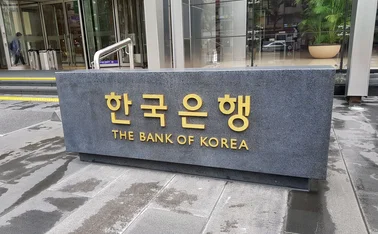
Zhu Guangyao on global financial governance, divergent monetary policy and IMF reform
China's vice-minister of finance

What is your assessment of the global economy?
Six years have passed since the bankruptcy of Lehman Brothers, yet the world has not fully stepped out of the shadow of the global financial crisis. For instance, the International Monetary Fund (IMF) downgraded its global economic forecast three times in 2014 (its latest expectation was for an annual global economic growth rate of 3.3%). The World Trade Organization (WTO) also lowered the expected global trade growth rate to 3.1%, compared with 5.2% in the past 20 years. This means that the growth rate is slowing, and that growth in trade is lower than expected. At present, the global economy is experiencing instability, uncertainty, imbalance and vulnerability.
Are the dynamics uneven, even polarised?
Last year, the imbalance of the global economy was demonstrated by the polarisation of emerging market countries. After the breakout of the crisis, the strong performance of the emerging market economies facilitated global economic growth. But in 2014, the growth rates of Russia and Brazil - both members of the Brics nations (with the group also comprising India, China and South Africa) - were only 0.2% and 0.3% respectively. Compared with these two countries, China and the US still enjoyed strong economic growth. The IMF maintained its optimistic prediction of China's 7.4% economic growth rate in 2014, and has not adjusted its prediction for the country's 2015 figure (7.1%). Meanwhile, the fund adjusted the economic growth rate of the US from 1.7% to 2.2% in 2014. China and the US will clearly be major contributors to growth in the global economy.
On the other hand, Europe still faces challenges. The IMF said economic growth in the eurozone is 0.8%. Meanwhile, the unemployment rate in Europe remains relatively high. Europe's two major economies, Germany and France, were expected to grow at a rate of 1.4% and 0.4% respectively. The market's concerns are obvious. Among the Asian economies, the IMF expected Japan's economic growth to be 0.9% in 2014. But after the adjustment for the introduction of a rise in domestic consumption tax, a 7% decrease occurred during the second quarter of 2014. By the end of October, the governor of the Bank of Japan lowered the central bank's economic growth prediction to 0.5% - 40 basis points lower than the IMF's prediction. This is not good news for either Japan's economy or for global economic growth. Structural adjustment - the ‘third arrow' of prime minister Shinzo Abe's administration - seems to be facing great challenges.
Are you concerned about deflation and divergent monetary policies?
The risk of deflation is currently driving the co-ordination of monetary policy among G20 countries. The solution to global deflation lies in financial policy. Today, world interest rates are at their lowest levels compared with any other period of business cycle recovery since the Second Word War. On the one hand, it reflects that the process of recovery is relatively slow. On the other, it implies there is a risk of deflation. Deflation has long been apparent in Japan, but recently the annual rate of inflation rate in the Europe was as low as 0.3-0.4%. The president of the European Central Bank (ECB), Mario Draghi, admitted in August that Europe was facing the risk of deflation, and said the ECB would not raise its interest rate before the middle of 2017. Therefore, the risk of deflation to the European economy will be great.
No major developed country can maintain its goal of a 2% inflation rate, which explains why the Bank of Japan has increased the Japanese money supply by ¥80 trillion per year. The Federal Reserve has started to end its quantitative easing (QE) policy, following three rounds of QE, amounting to around $3 trillion. While the overall benefits of QE are disputable, the programme did stabilise the US economy at the beginning of the crisis. Of course, the large amount of money printed also had an impact on the financial markets, which requires further study.
The key issue currently is whether the Fed will start the process of normalising interest rates because of improvements in the US economy. Fed chair Janet Yellen has clearly signalled that the first interest rate rise would be cautious - probably just 25 basis points. But the history of Fed actions shows that in all economic cycles, once the Fed has started the process of interest rate normalisation, the range of increase is more than just 25 basis points. Instead, it has raised rates steadily over a period of time, which has led to a stronger US dollar. Since the ECB has said it will not raise interest rates before the middle of 2017, the gap in interest rates between the US and Europe will probably widen during this period of time.
Looking at the monetary policies of the Fed, the ECB and the Bank of Japan, we can see the level of interest rates varies in major advanced economies based on their own economic circumstances. Changes in trade set-up, direct investment and the price of bulk commodities have a direct impact on interest rates. These three factors are all independent, but they also interact with one another directly. The overly slow global economic recovery has also added uncertainty to these factors.
How do you assess domestic financial reforms in the context of globalisation?
Over the past few years, the internationalisation of renminbi has been accelerated. In August 2014, the UK chancellor of the exchequer, George Osborne, told G20 finance ministers and governors of central banks in Washington DC that the British government planned to issue sovereign bonds in renminbi - with the proceeds from the issuance added to foreign reserves, instead of offsetting the UK's trade deficit. This was the first time a western country had issued national debt denominated in renminbi and the planned issue of 2 billion yuan was increased to 3 billion yuan because of the positive market reaction. An as industrialised country, Britain holds only a relatively small amount of foreign reserves. But it was a symbolic step that this was done by a G7 country, and is an important step for the internationalisation of the renminbi. At the same time, the People's Bank of China (PBOC) has initiated currency swaps and other activities with the ECB, the Bank of England and the Banque de France, which promotes the use of the renminbi in international financial markets.
China's financial reform will continue, notably in the capital account. But with the process of China's financial reform still under way, the IMF has urged a cautious opening of the capital account to minimise the risk of systematic failure. In fact, the PBOC had expected the speed of opening to be faster than present. But the international community is relatively cautious regarding this policy initiative, which shows that China's financial reform is important to not only Chinese structural adjustment, but also to the stability of the international financial markets.
There are several aspects of reform that require attention. The basic principles of supervising shadow banking is to cope with the relationship between moral hazard and the prevention of systematic and regional risk. The support of small and micro-businesses requires further reform of the financial system, which can be realised by the establishment of small private banks. China approved the establishment of five private banks in 2014, but this process still needs to be pushed forward. A deposit insurance system was clearly put forward in the Eighteenth National Congress of the Communist Party of China at the Third Plenary Session, and the next step is the full implementation of the policy.
What roles should China play in global financial governance?
The international financial set-up is moving into a new phase, and China is making contribution to and making use of the improvements of international finance. The country took an active part in the G20 process, particularly the work of the Financial Stability Board (FSB). This year, the FSB set three key policy goals to address related to: ‘too big to fail', cross-border derivatives trading and shadow banking. China participated in the policy-making process of all these three issues.
In addition to the policy discussion, the practice of China's financial reform itself helped the development of the FSB. Bank of China was among the first round of participants as a global systemically important bank, with Industrial and Commercial Bank of China (ICBC) and ABC (Agricultural Bank of China) subsequently joining it. In terms of international financial governance, especially the governance structure of commercial banks, China's voice and representativeness are rapidly improving.
In addition to policy discussions at the FSB, China also suggested distinguishing the rate of progress of developed countries from that of developing countries. The international governance system, especially in the governance of some big banks, requires some time.
In terms of the regulation of cross-border derivatives, the standardisation of accounting systems has an important global impact, and remains an urgent issue that needs to be addressed. Some differences still exist in accounting practices, and the US is unwilling to compromise. Although this issue has been on the agenda for a long time, the co-ordination of accounting policy has not yet been achieved. To facilitate agreement, joint efforts by Europe, the US and Japan are required, with compromises required. Global economic governance requires the strengthening of policy co-ordination and an increase in compromise and trust.
IMF reform
As a major developing country, China has its own voice, and has played its own part in international co-ordination - and its influence is increasing. But the key issue related to international economic governance is the position of the US. As the biggest economy in the world and the nation that dominates the international monetary system, the US needs to show wisdom and a sense of responsibility.
The US was the leader in constructing the international political, economic and financial systems in the post-war period. The system as a whole still faces many challenges - for example, how to operate in an effective and sustainable manner, and restore the credibility of the financial system after the 2008 financial crisis. One of the major challenges is reforming the shareholdings of the IMF. As a direct participant in the 2010 reforms, the US made a resolution on voting share reform that was approved by the G20 summit. But the plan has not been fulfilled because of its failure to secure approval in the US Congress. The 2010 IMF reform plan should be enforced immediately, as it is a requirement of all G20 members and other nations around the world. The US has been asked to shoulder its responsibility, and since it involves its own national interest, the US should have the wisdom to address the problem.
Since global economic growth is unstable, uncertainty is increasing and growth imbalances are significant, the current international financial system has a part to play and therefore consolidate its own position. The process of reforming the international financial governance structure has to be pushed forward, and this is the important policy and organisational basis for the current international financial system to work effectively.
Only users who have a paid subscription or are part of a corporate subscription are able to print or copy content.
To access these options, along with all other subscription benefits, please contact info@centralbanking.com or view our subscription options here: http://subscriptions.centralbanking.com/subscribe
You are currently unable to print this content. Please contact info@centralbanking.com to find out more.
You are currently unable to copy this content. Please contact info@centralbanking.com to find out more.
Copyright Infopro Digital Limited. All rights reserved.
As outlined in our terms and conditions, https://www.infopro-digital.com/terms-and-conditions/subscriptions/ (point 2.4), printing is limited to a single copy.
If you would like to purchase additional rights please email info@centralbanking.com
Copyright Infopro Digital Limited. All rights reserved.
You may share this content using our article tools. As outlined in our terms and conditions, https://www.infopro-digital.com/terms-and-conditions/subscriptions/ (clause 2.4), an Authorised User may only make one copy of the materials for their own personal use. You must also comply with the restrictions in clause 2.5.
If you would like to purchase additional rights please email info@centralbanking.com








